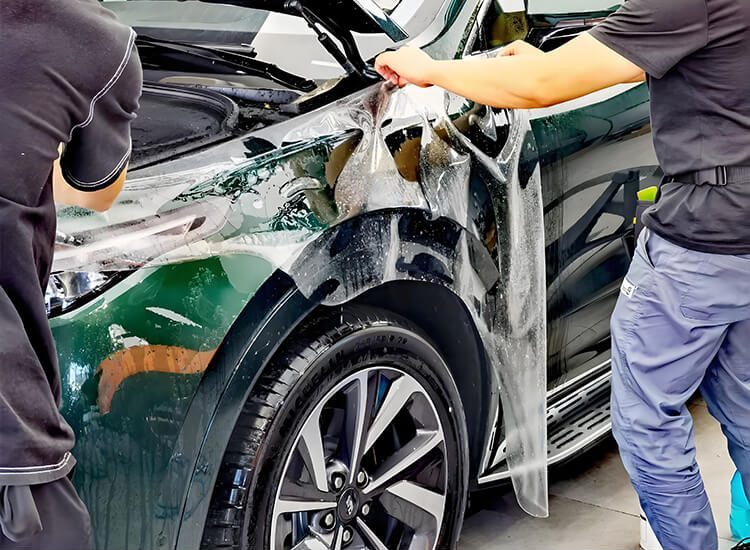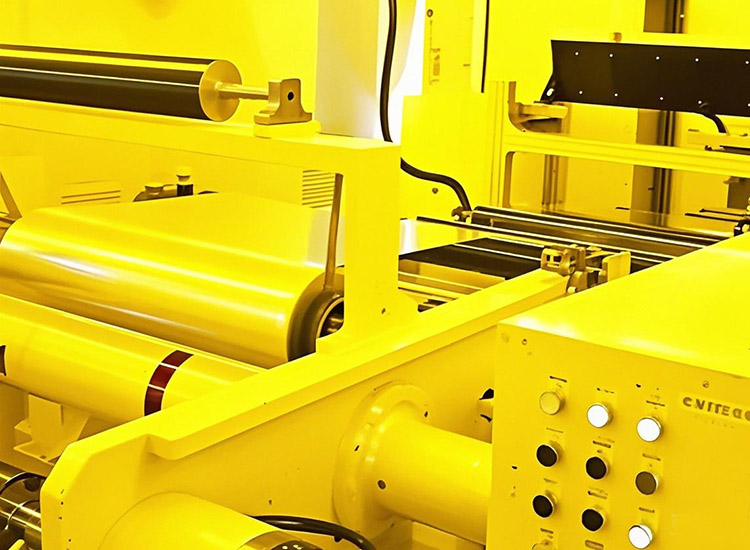What Is PPF Wrap: All You Need to Know
Car owners often look for ways to keep their vehicles looking new, and one of the most reliable solutions is a PPF wrap. Short for paint protection film wrap, this clear and durable layer protects your car’s paint from scratches, chips, stains, and UV damage. Whether you drive daily in busy Los Angeles traffic, cruise along London streets, or push your sports car in Dubai, a high-quality PPF wrap can make a big difference. Understanding what it is, how it works, and whether it is worth it helps you make the right choice.
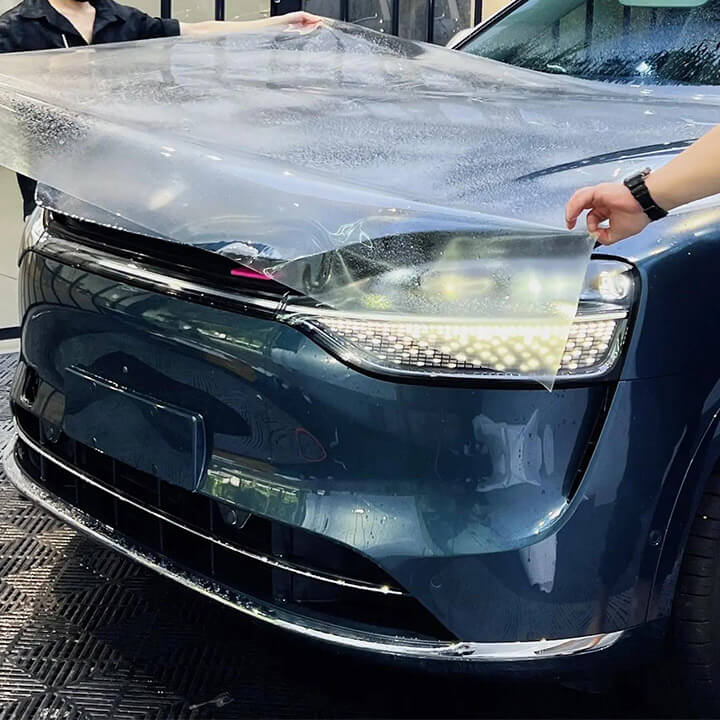
The Basics of PPF Wrap
PPF wrap, also known as clear bra wrap or car protection film, is a transparent film wrap for cars that bonds to the surface of your vehicle’s paint. It is nearly invisible, which is why some people call it an invisible car wrap. Its primary role is to act as a shield against small rocks, road debris, bird droppings, bug splatter, and even accidental scratches when parking in tight spots.
What Is PPF Wrap for Cars?
When people search for “what is PPF wrap for cars,” they want a clear explanation. Think of it as a second skin that keeps the original paint safe. Unlike vinyl wraps, which are often used for aesthetic changes like color or graphics, a paint protection film wrap focuses on performance, durability, and long-term protection. For more details, see What Is PPF.
How Does PPF Wrap Work?
The technology behind PPF has advanced significantly. Modern automotive paint protection wrap is made from thermoplastic urethane, a flexible yet strong material. This gives the wrap self-healing properties, meaning minor scratches and swirl marks can disappear when exposed to heat or sunlight. For car owners in places like Singapore or Australia, where strong sun exposure is a challenge, this feature helps keep vehicles looking flawless. You can also learn more about TPU vs PVC Car PPF to understand material differences.
Types of PPF Wrap
PPF wrap comes in several styles, each offering unique benefits for protection and appearance. Choosing the right one depends on your car type and personal preference. For a full guide, visit Types of Paint Protection Film.
Gloss Finish
Enhances the car’s shine and makes the paint look deeper while protecting against scratches and chips.
Matte Finish
Gives the vehicle a smooth, non-reflective look without repainting, perfect for a unique style.
Satin Finish
A balance between gloss and matte, offering a sleek and elegant appearance for luxury cars.
Self-Healing
Repairs light scratches with heat or sunlight, ideal for long-term durability and low maintenance.
Colored Options
Some brands provide tinted or colored protective films, combining style and protection in one layer.
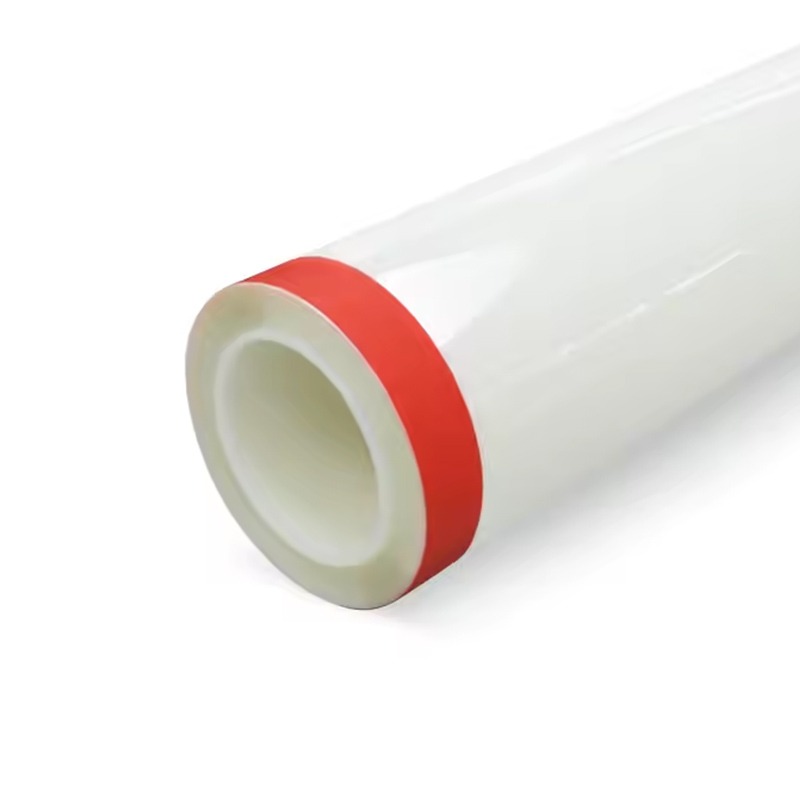
PreproPPF Clear PR-Q01
On a budget? Check out basic protection PPF PR-Q01, 5×50 ft, free shipping worldwide.
Types of PPF Materials
Not all paint protection film wraps are made from the same material. The quality, durability, and price often depend on the type of film you choose.
TPU (Thermoplastic Polyurethane)
The most advanced and popular option today. TPU films are flexible, highly durable, and usually self-healing. They resist yellowing and provide excellent clarity, making them the best PPF wrap for daily use and luxury cars.
PVC (Polyvinyl Chloride)
PVC films are cheaper and often used in entry-level car protection film wraps. While they offer basic scratch resistance, they are less flexible and more prone to yellowing compared to TPU.
TPH (Modified Polymer)
TPH is a mid-range material that combines some features of TPU and PVC. It is more durable than PVC but less advanced than TPU. TPH films are often chosen for budget-friendly PPF wrap installations. For a deeper dive, see PPF Thickness Explained.
PPF Wrap Cost Explained
One of the most common questions is about PPF wrap cost. The price varies depending on the car type, coverage area, and installer reputation. For example, a full-body installation in a city like Dubai or London could range from $3,000 to $7,000, while partial coverage such as the hood and bumpers might be $800 to $1,500. Searching “PPF wrap cost near me” often shows local results, but keep in mind that skilled installers charge more due to their expertise.
PPF Wrap Durability and Lifespan
How long does PPF wrap last? With proper maintenance, high-quality films can protect your car for 5 to 10 years. This lifespan depends on the climate, driving conditions, and whether you follow a good PPF wrap maintenance guide. For daily drivers in Los Angeles, where highways are busy and chips are common, this durability is especially valuable.
PPF Wrap vs Ceramic Coating
A common debate is the difference between PPF wrap and ceramic coating. Ceramic coatings create a glossy hydrophobic layer that repels water and dirt, but they cannot stop stone chips or scratches. In contrast, PPF wrap acts as a physical barrier. Some car owners choose to combine both: PPF wrap for impact resistance and ceramic coating on top for easy cleaning.
PPF Wrap vs Vinyl Wrap
Another frequent question is about PPF wrap vs vinyl wrap. Vinyl wrap is mainly for changing your car’s appearance—adding a new color or finish. It is cheaper but lacks the protective qualities of PPF. A protective car film like PPF is engineered to absorb impact, resist scratches, and self-heal, which vinyl cannot do.
Benefits and Disadvantages of PPF Wrap
Like any product, PPF wrap comes with pros and cons.
PPF Wrap Benefits
- Shields your car paint from stone chips, scratches, and UV damage
- Extends the lifespan and resale value of your vehicle
- Invisible protection that does not alter the car’s look
- Available in gloss, matte, or satin finishes to suit your style
- Ideal for luxury cars, Teslas, or any daily-use vehicle
- For a detailed list, check 10 PPF Benefits
PPF Wrap Disadvantages
- Initial cost is higher than other protective solutions
- Requires professional installation for the best results
- Poor-quality wraps or bad installation may peel or yellow over time
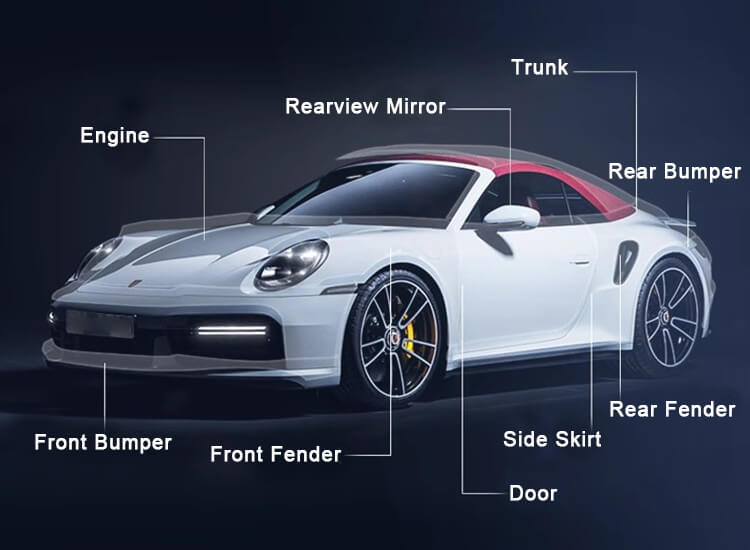
PPF Wrap Coverage by Vehicle Type
| Vehicle Type | Full Coverage (Approx.) | Partial Coverage (Front Hood/Bumper/Mirrors) |
|---|---|---|
| Sedan | 50–70 feet | 15–25 feet |
| SUV / Crossover | 70–100 feet | 20–30 feet |
| Pickup Truck | 90–110 feet | 25–35 feet |
| Sports Car | 60–90 feet | 20–30 feet |
| Luxury Car | 70–100 feet | 20–30 feet |
For more details on how much PPF you might need, check PPF Usage Volume.
DIY PPF Wrap vs Professional Installation
While DIY kits exist, professional installation is strongly recommended. Applying transparent film wrap for cars is tricky; it requires precision, a dust-free environment, and proper tools. A professional installer ensures the wrap adheres seamlessly without bubbles or wrinkles. If you search for “best PPF wrap installers” in your city, reviews and portfolios can help guide your decision.
PPF Wrap Protection for Tesla and Luxury Cars
Owners of Tesla, BMW, or Mercedes often ask if PPF wrap is worth it. These vehicles have high-value paint jobs, and small scratches or chips can lower their resale value significantly. Installing a car paint wrap protection film keeps them looking pristine. For Tesla owners especially, the factory paint is known to be relatively soft, making protection even more important.
PPF Wrap Maintenance Guide
Once installed, maintenance is simple. Wash your car regularly using pH-neutral soap, avoid harsh chemicals, and dry with microfiber towels. Do not use abrasive polishes, as they can damage the film. Some owners also apply ceramic coatings on top of their PPF for easier cleaning. With proper care, your protective car film can maintain clarity and performance for years.
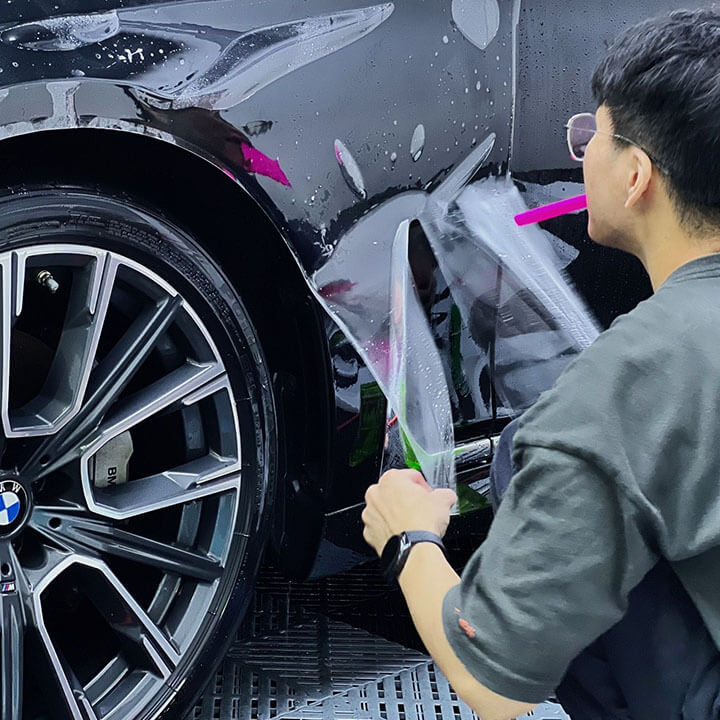
Top 5 Global PPF Brands
| Brand | Key Features | Recommended For | Notes |
|---|---|---|---|
| XPEL | Self-healing, excellent clarity | Luxury & sports cars | Highly durable, widely trusted |
| 3M Scotchgard | Scratch & chip resistance | Daily drivers | Pioneer in protective films |
| SunTek | Gloss, matte, colored options | All car types | Easy installation, durable |
| Llumar | High-quality protection & aesthetics | Full-body or partial wraps | Popular in Europe & North America |
| PreproPPF | Self-healing, anti-yellowing | All car types | Factory-direct, global free shipping; see Best 10 PPF Brands in 2025 for more |
PPF Wrap Reviews and Real-World Use
User reviews often highlight satisfaction with the durability and peace of mind that PPF offers. Car owners in different regions—from the bustling streets of London to the hot roads of Dubai—report that their cars stay newer for longer. Reviews also show that choosing a high-quality film and skilled installer makes a major difference in the final outcome.
Is PPF Wrap Worth It?
The ultimate question is whether a PPF wrap is worth the investment. For those who plan to keep their cars long-term or want to maintain high resale value, the answer is yes. While the initial cost may be high, the long-term protection against paint repairs, resprays, and devaluation makes it worthwhile.
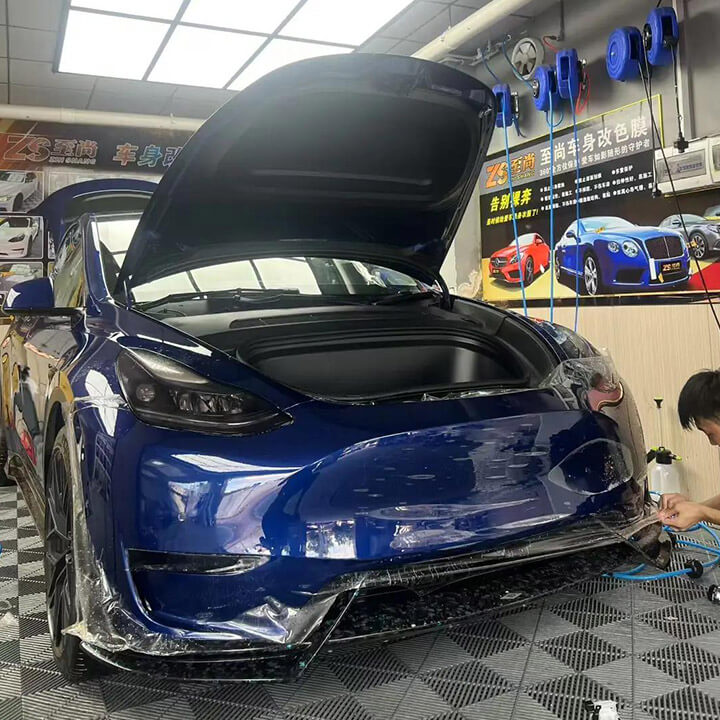
PreproPPF Clear PR-Q01
On a budget? Check out basic protection PPF PR-Q01, 5×50 ft, free shipping worldwide.
PreproPPF Sales: PPF without Shipment to Argentina
PreproPPF is a trusted manufacturer specializing in premium paint protection film wrap. With direct factory sales, we deliver high-quality automotive protection film at competitive prices. Our global logistics network ensures free door-to-door delivery to customers in over 50 countries. Whether you are in the U.S., Europe, or Asia, PreproPPF provides reliable PPF solutions backed by professional support.
FAQs
How Much Do PPF Wraps Cost?
The cost of a PPF wrap varies based on car size, coverage area, and installer quality. Full-body wraps can range from $3,000 to $7,000, while partial coverage like the hood and bumpers usually costs $800–$1,500.
What Is A PPF Wrap?
A PPF wrap (paint protection film wrap) is a transparent, durable film applied to your car’s paint to protect it from scratches, chips, UV damage, and environmental stains. It acts as an invisible shield while maintaining the original look.
How Long Does A PPF Wrap Last?
With proper care, a professionally installed PPF wrap can last between 5 to 10 years, depending on driving conditions, climate, and maintenance practices.
Which Is Better, PPF Or Wrap?
PPF wrap is designed for protection, preventing scratches, chips, and damage. Vinyl wraps are mainly for changing the car’s appearance. If protection is your priority, PPF is the better choice.
PPF Wrap vs Ceramic Coating
PPF provides a physical barrier against scratches and chips, while ceramic coating creates a hydrophobic layer that repels water and dirt. Many car owners combine both for maximum protection and easier maintenance.

